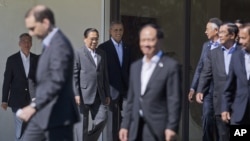It has now been some time since the special summit between the leaders of the Association of Southeast Asian Nations (ASEAN) and U.S. President Barack Obama at Sunnylands, California, on Feb. 15-16. The meeting was the first of its kind to be held on American soil, and signaled the U.S. intention to step up engagement with Southeast Asia as China rises as an economic and military power.
For Cambodia’s government, the meeting offered a glimmer of hope for improved trade ties with the U.S., and enabled Prime Minister Hun Sen to take part in high-level talks on an equal standing other leaders.
“We are doing our best to make sure that the U.S. opens up for Cambodia, as well as ASEAN, to continue to import products from Cambodia, especially agricultural products,” said Kao Kimhourn, minister attached to the prime minister.
“This also includes attracting investment and tourists from the U.S., too. Especially, we want the U.S. to continue to provide support on technical capacity building.”
At the conclusion of the meeting, the leaders issued a 17-point-joint declaration calling for the reduction of tensions in the South China Sea—where several ASEAN states have territorial disputes with China—and the introduction of new initiatives, includes one known as “U.S.-ASEAN Connect.”
“‘Connect’ will provide a new opportunity to investors, traders and business people from ASEAN and the U.S. to meet on a regular basis to boost the economy,” said Kimhourn.
The volume of trade between the U.S. and the 10 countries of ASEAN totals about $240 billion, with the U.S. exporting goods and services to ASEAN worth more than $100 billion. This is relatively low compared to trade between China and ASEAN countries, which stands at $480 billion.
Currently, garments are the leading Cambodian export to the U.S., but Cambodian officials also want the U.S. to buy more rice from the country.
“What we expect more of is agricultural products [exports],” said Phay Siphan, a secretary of state at the Council of Ministers. “In return, we hope to help the U.S. save a lot of money by buying cheap products from Cambodia, which will enable U.S. citizens to buy more.”
Despite Cambodia’s small size and its status as one of ASEAN’s least developed countries, its close ties with China give it some diplomatic heft, especially when it comes to the issues of the South China Sea. During Cambodia’s chairmanship of ASEAN in 2012, its representatives resisted efforts led by the Philippines and Vietnam to specifically denounce Chinese aggression in maritime disputes with those countries.
However, the Sunnylands declaration—which Cambodia supported—included commitments to solving the disputes multilaterally and through ASEAN. China prefers to deal with its small rivals in the South China Sea bilaterally, and rejects what it sees as U.S. meddling in its backyard.
“We highly valued the [Sunnylands] summit. That’s why we supported the joint declaration,” said Siphan. “But ASEAN has not come up with a framework or how our commitment should be. We, the ASEAN community, have already committed on several issues, especially on human rights and economic fronts. We will continue to strengthen them.”
Siphan said Cambodia was committed to pacifism in disputes in the South China Sea, and said the country did not take China’s side.
“Cambodia maintains the same position, which is to see talks taking place and we want to see China and the U.S. talk to each other, rather than armed confrontation,” he said. “We want China to solve the problem with claimant parties, not have armed confrontation.”
The ruling Cambodian People’s Party, for its part, sees the Sunnylands summit as evidence it has successfully steered Cambodia into a closer relationship with the U.S.
“Through this ASEAN-U.S. summit, we saw that the position of U.S. President Barrack Obama is not discriminatory,” said CPP spokesman Sok Eysan. “His warm welcome of all 10 ASEAN leaders showed respect and equality.”
And, of course, the summit also signals potential new economic opportunities.
“We hope that after the ASEAN-U.S. summit there will be more foreign investment, especially from the U.S., coming to Cambodia,” Eysan added.
However, the two-day summit was marred by protests from communities of U.S.-based Cambodians, Laotians and Thais, as well as activists who opposed the Trans-Pacific Partnership trade agreement. The Cambodian community demanded respect for human rights and broader political freedom in Cambodia.
CPP spokesman Sok Eysan had a different interpretation.
“We saw that the president [Obama] did not follow the requests from some opposition groups and some organizations that wanted the U.S. president to put pressure on the government of Cambodia,” he said. “He [Obama] maintained a stance of mutual respect and equality.”
The U.S. Ambassador to ASEAN, Nina Hachigian, has said the summit did touch on human rights issues in Cambodia. However, Cambodia’s ambassador to ASEAN, Norng Sakal, has insisted that human rights were only mentioned in general.
“It is true that U.S. President Barack Obama raised the issue of democracy and respect for human rights in general without mentioning any country,” said Sakal said in a statement.
While Cambodian officials preferred to put a spotlight on the economy and trade, observers say this does not relieve leaders of their responsibilities to respect human rights and political freedom.
In fact, the Sunnylands declaration, which Hun Sen supported, includes a commitment “to ensure opportunities for all of our peoples, through strengthening democracy, enhancing good governance and adherence to the rule of law, promoting and protecting human rights and fundamental freedoms, encouraging the promotion of tolerance and moderation, and protecting the environment.”




